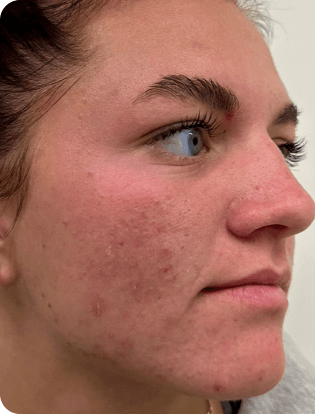Achieve Your Goals with the Advanced Weight Loss Clinic
Personalized, medically supervised programs for lasting health, fitness success, and sustainable results at our advanced weight loss clinic.
Transform Your Health with Our Advanced Weight Loss Clinic
At Luxx Med Aesthetics & Wellness, our advanced Weight Loss Clinic provides personalized, medically supervised weight loss programs. They are designed to help you achieve your health and fitness goals.
Our doctor-supervised weight loss programs, overseen by Michigan Board-Certified Physicians, ensure your progress is closely monitored. Patients meet monthly with a medical provider to stay on track and achieve lasting success.
Our weight loss medications work by aiding in weight loss and managing type 2 diabetes. They mimic hormones that regulate blood sugar and reduce appetite, with suitability determined based on each patient’s unique health needs and medical history to ensure a safe and effective approach.

Medications We Prescribe
Mounjaro (Tirzepatide)
A weekly injection that mimics hormones to control blood sugar and reduce appetite.
- Lowers blood sugar levels effectively.
- Reduces appetite, aiding in weight loss.
- Supports overall metabolic health.
Ozempic
A medication that lowers blood sugar and curbs appetite to promote weight loss.
- Controls blood sugar and promotes weight reduction.
- Suppresses appetite, leading to fewer cravings.
- Convenient once-weekly dosing.
Discover Microneedling for rejuvenated, radiant skin.
- Session Length: Typically 30-45 minutes.
- Minimal Downtime: Mild redness and swelling last 1-3 days.
- Aftercare: Hydrate, avoid direct sun, and use a gentle skincare routine to protect your refreshed skin.


Why Choose Us?
Comprehensive, Medically Supervised Care
Our programs are overseen by Michigan Board Certified Physicians, ensuring your health and progress are closely monitored every step of the way.
Tailored Solutions for Individual Needs
We create personalized weight loss plans based on your unique health profile, goals, and lifestyle, offering a customized path to success.
Diverse Range of Medications
From appetite suppressants to hormone-mimicking injections, we provide a variety of FDA-approved weight loss medications to support your journey.
Holistic Health Approach
Our treatments not only promote weight loss but also address related concerns like managing type 2 diabetes, improving metabolism, and enhancing overall wellness.
Long-Term Success Focus
Monthly check-ins with medical providers ensure accountability, consistency, and sustainable weight loss results over time.
Empowering Support System
Our advanced weight loss clinic offers guidance and encouragement, helping you stay motivated, achieve your goals, and unlock a healthier, happier version of yourself.
Plenity
A capsule is taken before meals to help you feel full, reducing food intake and aiding in weight loss.
- Creates a feeling of fullness to curb overeating.
- Supports portion control for better weight management.
- Safe and effective when used with a balanced diet.
Qsymia (Phentermine/Topiramate)
A combination drug that suppresses appetite and promotes weight loss.
- Reduces appetite and cravings for long-term results.
- Enhances weight loss when combined with lifestyle changes.
- Helps maintain focus and energy levels.
Saxenda (Liraglutide)
An injection that reduces hunger and helps manage weight by regulating appetite.
- Controls appetite and reduces calorie intake.
- Supports gradual and sustained weight loss.
- Improves overall health markers like blood pressure.
Tenuate
An appetite suppressant used to assist in short-term weight management.
- It helps control hunger to aid weight loss efforts.
- Increases energy for more effective workouts.
- Supports adherence to a calorie-controlled diet.
Wegovy
A weight loss injection that reduces appetite and aids in long-term weight management.
- Provides effective appetite suppression.
- Supports consistent weight loss over time.
- Helps maintain energy levels throughout the day.
Xenical (Orlistat)
A medication that blocks fat absorption, aiding in fat reduction when used with a low-fat diet.
- Prevents the body from absorbing dietary fat.
- Encourages healthy eating habits.
- Helps sustainably reduce overall body weight.
FAQs
Medical weight loss is a comprehensive weight management program supervised by healthcare professionals. It may include a combination of diet plans, exercise regimens, behavioral therapy, medication, and sometimes medical procedures to help individuals achieve and maintain a healthy weight. These programs are tailored to each person’s unique needs and may be recommended for those who have struggled to lose weight through conventional methods.
Medical weight loss is typically recommended for:
- Individuals who are significantly overweight or obese.
- Those who have been unable to lose weight through diet and exercise alone.
- People with medical conditions related to obesity (e.g., type 2 diabetes, high blood pressure, sleep apnea).
- Individuals seeking a medically supervised program to help ensure safe and effective weight loss.
A healthcare provider will assess your overall health and determine whether a medical weight loss program is appropriate for you.
- Personalized approach: A program designed specifically for you, considering your medical history, lifestyle, and weight loss goals.
- Supervised care: Regular check-ins with healthcare professionals to monitor your progress and adjust your plan as needed.
- Increased success rate: Studies have shown that medical weight loss programs are often more effective than self-guided weight loss efforts.
- Treatment of underlying conditions: Weight loss programs can help manage or reverse obesity-related conditions, such as high cholesterol, diabetes, and joint pain.
- Support and accountability: Ongoing support from professionals helps keep you on track and motivated.
A medical weight loss program typically includes:
- Nutritional counseling: Personalized diet plans tailored to your specific needs, preferences, and goals.
- Exercise plans: A fitness regimen that suits your fitness level and promotes fat loss while maintaining muscle mass.
- Behavioral therapy: Counseling to address emotional eating, food triggers, and lifestyle habits that affect weight.
- Weight loss medications: FDA-approved prescription medications may be prescribed to help reduce appetite, boost metabolism, or prevent fat absorption.
- Bariatric procedures: In some cases, more invasive treatments such as weight loss surgery (e.g., gastric bypass or sleeve gastrectomy) may be considered for individuals with severe obesity.
There are several FDA-approved medications that may be prescribed as part of a medical weight loss program, including:
- Appetite suppressants: These drugs reduce hunger and can help with portion control (e.g., Phentermine, Contrave).
- Fat absorption inhibitors: Medications like Orlistat (Alli) block the absorption of some dietary fat.
- Metabolic boosters: Medications that help boost metabolism and promote fat burning (e.g., Qsymia).
- GLP-1 receptor agonists: Drugs like Semaglutide (Wegovy) help regulate appetite and blood sugar levels, promoting weight loss.
Medications are usually prescribed when diet and exercise alone aren’t enough to achieve weight loss and may be used alongside lifestyle changes for better results.
Exercise plays a key role in any weight loss program, including medical weight loss. A customized exercise plan is developed based on your fitness level and goals. Regular physical activity can help:
- Burn calories
- Increase muscle mass
- Improve cardiovascular health
- Boost metabolism
- Promote long-term weight maintenance
The amount and type of exercise may vary depending on your individual needs, and your healthcare provider will guide you on what’s best for you.
- Initial Consultation: Your doctor will assess your health history, current weight, and lifestyle to develop a tailored program. You may also undergo lab tests to check for any underlying health conditions.
- Personalized Plan: A diet plan, exercise regimen, and weight loss medications (if needed) will be prescribed. You will receive ongoing support and adjustments to the plan as needed.
- Regular Monitoring: You will have scheduled check-ins with your healthcare provider to monitor your progress, review your results, and make any necessary modifications to your plan.
- Long-Term Support: Many medical weight loss programs include long-term follow-up care to ensure that you maintain your weight loss and stay on track.
The amount of weight loss varies by individual and depends on several factors, including:
- Your starting weight
- The specific weight loss program used
- Adherence to the prescribed diet and exercise plan
- The use of medications or medical procedures
On average, individuals can expect to lose about 1-2 pounds per week with a medically supervised program. However, more significant weight loss may occur in some cases, especially when using medications or undergoing bariatric procedures.
Yes, medical weight loss programs are designed to be safe, especially when supervised by a qualified healthcare provider. The programs take into account your health history, lifestyle, and any medical conditions to ensure a safe and effective approach to weight loss. It’s important to follow the program’s guidelines and stay in regular contact with your provider to monitor your health and progress.
While medical weight loss programs are generally safe, there can be some risks, including:
- Side effects of medications: Some weight loss medications may cause side effects like nausea, constipation, headaches, or increased heart rate. These should be monitored by your doctor.
- Nutrient deficiencies: Restrictive diets may cause deficiencies in essential vitamins and minerals, so it’s important to follow the nutritional guidelines provided.
- Psychological impact: Extreme calorie restrictions or rapid weight loss can sometimes cause emotional distress or unhealthy relationships with food. Behavioral therapy can help address these issues.
The timeframe to see noticeable weight loss results varies for each individual. Many people begin to see changes within the first few weeks, with significant weight loss occurring over the course of several months. It’s important to focus on long-term health improvements rather than quick fixes.
Maintaining weight loss is often the most challenging part of the journey. Some strategies to maintain your weight loss include:
- Continuing with a healthy, balanced diet
- Engaging in regular physical activity
- Monitoring your weight regularly
- Seeking ongoing support from your healthcare provider
- Adopting new healthy habits and managing emotional eating
Your healthcare provider may continue to support you after completing the program to ensure you stay on track.
The cost of medical weight loss varies depending on the program, the treatments involved (such as medications or procedures), and the clinic you choose. Typically, programs may cost anywhere from $200 to $300 per month. For current price and package please contact Luxx representative.
Some health insurance plans may cover certain aspects of medical weight loss, especially if the individual has health conditions related to obesity (such as type 2 diabetes, hypertension, or sleep apnea). However, coverage can vary widely depending on the plan and location. Be sure to check with your insurance provider to see what is covered under your plan. At Luxx we do not accept any insurance.
